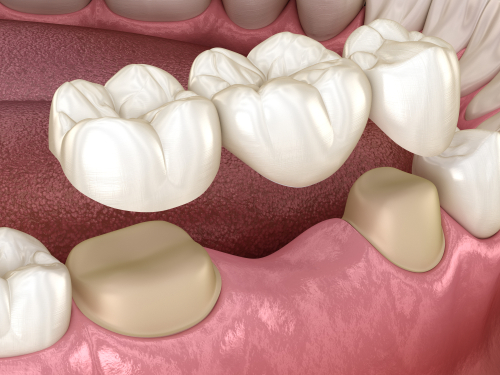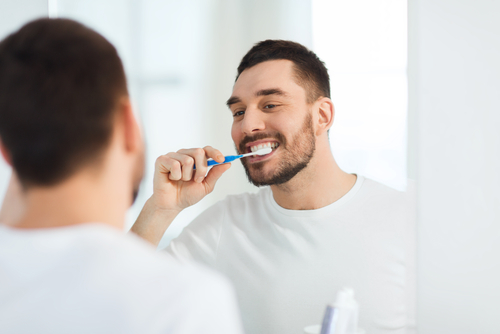Restore Your Smile’s Foundation With Dental Bridges
Dental bridges are an effective solution for those grappling with missing teeth, offering both functional and aesthetic benefits. At Katy Smile Design, our experienced Katy, TX dentists, Dr. Lauren Shepard and Dr. Catherine Wilder, provide two primary types of dental bridges: Traditional Dental Bridges and Implant-supported bridges. These options cater to various needs, ensuring individuals can regain confidence in their smiles.
If you’re ready to transform your smile, contact our Katy dental office by calling (281) 396-4366.
What are Dental Bridges?
Dental bridges are prosthetic devices designed to bridge the gap created by one or more missing teeth. They consist of artificial teeth, known as pontics, which are anchored onto adjacent natural teeth or dental implants. This restoration not only enhances appearance but also aids in chewing and speaking properly.
Types of Dental Bridges Offered at Katy Smile Design
- Traditional Dental Bridges: These bridges involve creating crowns for the teeth on either side of the gap and placing a false tooth in between.
- Implant-supported Bridges: These bridges are supported by dental implants surgically placed into the jawbone, providing a more secure and stable foundation.
Benefits of Dental Bridges
Your Katy dentists typically recommend dental bridges due to their various benefits, including:
- Improved Appearance: Bridges fill in gaps, restoring a natural smile.
- Enhanced Functionality: They enable proper chewing and speech.
- Preservation of Oral Health: Bridges prevent surrounding teeth from shifting and maintain facial structure.
- Boosted Confidence: Regaining a complete smile can significantly improve self-esteem.
Who Qualifies for Dental Bridges?
- Missing Teeth: Candidates should have one or more missing teeth that require replacement.
- Good Oral Health: A healthy mouth with minimal gum disease or decay is essential for successful bridge placement.
- Healthy Adjacent Teeth: The teeth adjacent to the gap must be strong enough to support the bridge.
- Adequate Bone Structure: Sufficient jawbone density is necessary, especially for implant-supported bridges.
Dental Bridge Procedure
Initial Consultation
You meet with your Katy dentist for a thorough evaluation of your oral health and discussion of your treatment goals. If dental bridges are determined to be the best option, a personalized treatment plan is created based on your needs.
Preparation
Abutment teeth are prepared by reshaping them to make room for dental crowns. This involves removing a thin layer of enamel. For implant-supported bridges, dental implants are surgically placed into the jawbone to serve as sturdy anchors for the bridge.
Impressions
Detailed impressions of your teeth, gums, and the gap are taken using dental putty or digital scanning technology. These impressions capture the precise dimensions and alignment of your teeth, ensuring a custom-fit bridge.
Temporary Bridge Placement
While the permanent bridge is being fabricated in a dental laboratory, a temporary bridge is placed to protect your prepared teeth and maintain your smile’s appearance. This temporary solution helps to prevent discomfort and maintain function until the permanent bridge is ready.
Final Fitting
Once the permanent bridge is ready, you return to Katy Smile Design for the final fitting. The bridge is carefully fitted and adjusted to ensure proper alignment, comfort, and bite. Once satisfactory, the bridge is permanently cemented onto the abutment teeth or attached to the implants.
Dental Bridge Maintenance
Once your dental bridge is in place, proper maintenance is essential to ensure its longevity and effectiveness. It’s important to follow these aftercare tips:
- Regular Oral Hygiene: Maintaining good oral hygiene is crucial for the health of your dental bridge and surrounding teeth. Brush your teeth at least twice a day with a fluoride toothpaste and floss daily. Pay special attention to cleaning around the base of the bridge where it meets the gumline to remove plaque and food debris.
- Use of Specialized Tools: Your Katy dentist may recommend using interdental brushes or floss threaders to clean around and underneath the bridge. These specialized tools can help you reach areas that regular toothbrushes and floss may not reach effectively.
- Routine Dental Check-ups: Schedule regular dental check-ups at our Katy dental office for professional cleanings and examinations. During these visits, Dr. Shepard or Dr. Wilder will inspect your dental bridge for any signs of damage or deterioration and make any necessary adjustments.
- Avoid Hard or Sticky Foods: Be mindful of the foods you eat to prevent damage to your dental bridge. Avoid chewing on hard or sticky foods that could potentially dislodge or damage the bridge. Opt for softer foods and cut larger items into smaller, more manageable pieces.
Frequently Asked Questions
How long do dental bridges last?
Dental bridges can last for many years with proper care and maintenance. On average, they may last anywhere from 5 to 15 years or even longer. Factors such as oral hygiene practices, dietary habits, and regular dental check-ups can impact the longevity of dental bridges.
Do dental bridges feel natural?
With advancements in dental technology and materials, dental bridges are designed to look and feel natural within the mouth. Patients often report that they quickly adapt to their bridges and experience no discomfort while eating or speaking. However, it may take some time to adjust to the sensation of the bridge initially.
Are dental bridges covered by insurance?
Many dental insurance plans provide coverage for dental bridges, especially if they are deemed medically necessary to restore oral function and aesthetics. However, coverage varies depending on the specific insurance plan and individual circumstances. It’s advisable to check with your insurance provider to understand your coverage and any associated costs.
Are there alternatives to dental bridges?
Yes, there are alternative options for replacing missing teeth, including dental implants and removable dentures. Dental implants are surgically placed into the jawbone and provide a permanent, long-term solution for replacing missing teeth. Removable dentures are prosthetic devices that can be taken out and cleaned daily.
Embrace a More Functional Smile at Katy Smile Design
Dental bridges serve as a reliable solution for those dealing with missing teeth, offering not only functional benefits but also enhancing overall appearance and confidence. At Katy Smile Design, we prioritize providing tailored solutions to restore smiles and improve oral health. Schedule a consultation by calling (281) 396-4366 to explore your options and embark on the journey to a complete, radiant smile.



